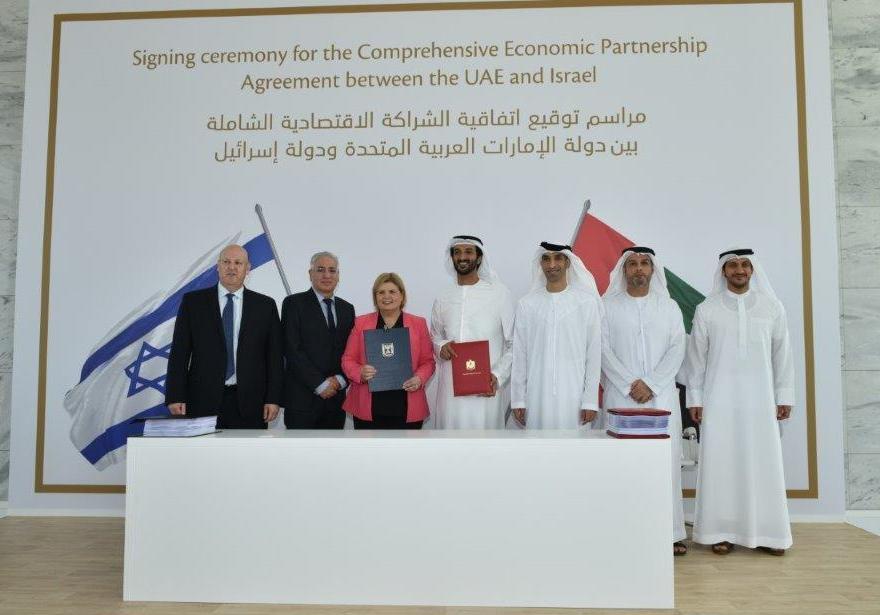Jerusalem, 31 May, 2022 (TPS) — Israel and the United Arab Emirates (UAE) signed a historic Free Trade Agreement (FTA) on Tuesday, Israel’s first free trade zone agreement with an Arab state.
Israel’s Minister of Economy and Industry Orna Barbivai and the UAE Minister of Economy Abdalla Bin Touq Al-Marri signed the agreement in Dubai.
The agreement, described as “comprehensive, significant, and ground-breaking,” is expected to increase bilateral trade in goods and services, increase Israeli exports to the UAE and provide customs exemption on 96% of trade between the countries in food, agriculture, cosmetics, medical equipment, and medications.
The agreement also relates to regulatory and standardization issues, customs, collaboration, government procurement, e-commerce and intellectual property rights
Barbivai stated that the FTA is “expected to strengthen bilateral trade, to break down obstacles and to advance new economic opportunities and partnerships, which will serve as a basis for our shared path.”
The UAE’s Minister of Industry and Advanced Technology Dr. Sultan bin Ahmed Al Jaber said that the UAE “continues to take bold steps forward to advance our economy and improve our status as a regional center for trade, investments and industries. The trade agreement with Israel will create a new paradigm for the region. This agreement will accelerate economic growth and strengthen the common belief that the only way to build durable and sustainable economies in the complex world is together.”
“This agreement represents something larger than business: the importance of building significant partnerships,” he underscored. “Our agreement can prove to countries and governments around the world that cooperation and dialogue are the best way to transform challenges to opportunities.”
The Abraham Accords, which were signed in September 2020, established diplomatic relations between the State of Israel and the UAE, and shortly after that with Bahrain, Sudan and Morocco. About a year later, in November 2021, negotiations on an FTA began between the parties, which was completed on April 1, 2022.
The negotiations lasted five months and included four rounds of negotiations.
Om Monday, Barbivay met with Al Jaber and signed the Memorandum of Understanding for Cooperation in Advanced Manufacturing.
The UAE is the second-largest economy in the Arab world, after Saudi Arabia, with market imports worth hundreds of billions of dollars and significant weight placed on technology products and advanced solutions, where Israel holds a relative advantage.
Since the signing of the Abraham Accords, trade in goods between the UAE and Israel has significantly increased, reaching $885 million in 2021. The volume of exports in 2021 was $317 million, most of which relates to diamonds, but also electrical and electronic equipment, transportation vehicles and oil. The volume of imports in 2021 stood at $306 million, most of which relates to diamonds but also large volumes of electrical and electronic equipment, jewelry, minerals, fuel, and oil. Since the establishment of diplomatic relations in August 2020, bilateral trade volume has reached about one billion dollars.
According to Foreign Trade Administration estimates, the agreement is expected to increase the volume of trade between the two countries by hundreds of millions of dollars in the first years following the signing of the agreement.
In that venue, the parties mutually granted suppliers and companies access to the government procurement market and opened up the possibility of participating in government procurement tenders that government ministries publish in both countries.
As part of the agreement, a joint committee will be established whereby continuous discussion can take place between the parties on economic issues. The committee will provide a platform for discussion of trade barriers and requests from the industry.
About 70% of Israel’s international trade takes place within the framework of FTAs.
In the past decade, Israel signed or upgraded an FTA with South Korea, Colombia, Canada, Ukraine, and the United Arab Emirates. This doubles the seven agreements that were in force in 2009.
In addition, Israel is currently negotiating with a variety of other significant markets such as China, Vietnam, Russia, Belarus, Kazakhstan, Kyrgyzstan, Guatemala, and Armenia.
